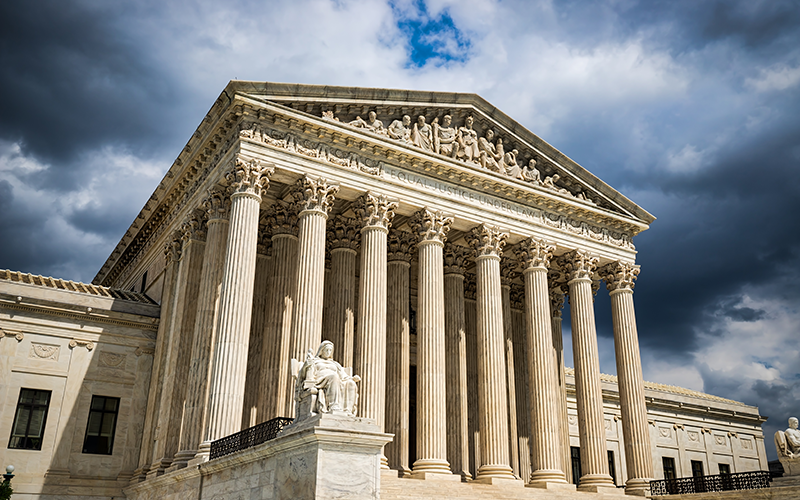(LOS ANGELES) — The U.S. Supreme Court has expressed an interest in hearing at least one of four cases being appealed during the current session in which unions have relied on dubious measures to ignore a 2018 SCOTUS ruling recognizing the First Amendment right of government employees to opt out of membership and dues.
The court on Jan. 6 asked the Los Rios (Calif.) Classified Employees Association (LRCEA) and the California Attorney General’s Office to file responses to a lawsuit filed in November by the Freedom Foundation on behalf of Kristine Kurk, a benefits technician for the Los Rios Community College.
The request doesn’t necessarily mean the court will agree to take the case, but it does show the justices are intrigued enough to want more information before making that determination.
Kurk asserts her request to leave LRCEA is being ignored because of an unconstitutional law and an agreement she signed 25 years ago — long before SCOTUS affirmed in Janus v. AFSCME that compulsory union membership and dues in the government workplace violate the employees’ right to free speech and association.
When she was first hired in 1997, Kurk had little choice but to permit the district to deduct dues from her paycheck on behalf of LRCEA by signing a “dues check-off form” that gave her only two options — full membership and dues of $13 per month or non-membership and a so-called “agency fee,” which also totaled $13 per month.
The form specified no restrictions on terminating union membership or withdrawing authorization for dues deductions.
Kurk sought to leave the union in 2018, but LRCEA officials denied her request, citing her dues check-off form and a California law preventing public employees from leaving their union while its collective bargaining agreement with the agency they work for is still in force.
There are two problems with that reasoning:
1. The dues-check-off form Kurk signed in 1997 — which, again, placed no limits on her ability to resign her union membership — is not an agreement to maintain union membership, nor is it an agreement with the union at all. At most, it is simply her authorization to the college district for the method of dues deductions.
2. The First Amendment protects a public employee’s right to resign membership, and a California law cannot overrule the Constitution by forcing her to associate with a union, potentially forever.
“Taken to its logical conclusion, the California statute would allow a union to keep members in the fold in perpetuity simply by renegotiating their existing collective bargaining agreement before it expires,” said Shella Alcabes, an attorney with the Freedom Foundation, a national public policy watchdog that has represented numerous public employees in their struggle to free themselves from union bondage.
In prior Janus-related appeals, Alcabes noted, the Freedom Foundation has cited First Amendment protections for free speech because the ruling specifically noted that forcing government employees to fund a union — whose activities are, by definition, political — amounted to compelled speech.
Kurk is the first case to rely, instead, on the freedom of association argument.
The appeal notes:
“If a public employer and union, pursuant to state statute, can enter a contract to restrict free association rights by preventing union members from ever resigning membership, then millions of public employees across the country cease to have a meaningful right to freedom of association.”
Kurk and the Freedom Foundation originally filed suit in 2019 but a district court judge granted the state’s motion for a summary judgment. The 9th Circuit Court of Appeals, in August 2022, concurred t, ruling that her “continued union membership and the deduction of union membership dues arose from the private membership agreement between the union and Kurk” and that it did not trigger any “constitutional scrutiny.”
“A state statute and collective bargaining agreement, not a private agreement between employee and union, compelled Kurk to maintain union membership over her objection,” the Freedom Foundation’s appeal countered. “First Amendment protections against coerced association are undoubtedly triggered when the state grants its coercive powers to a private union to control union members’ relationship with their union. Denying public employees associational rights under the Constitution simply because they were once union members has no basis in precedent and no foundation in logic.”
Kurk is one of four union-related cases appealed by the Freedom Foundation to the Supreme Court during the current session.
In two of the other three — Wright v. SEIU 503 and Zielinski v. SEIU 503 — even the acknowledgment that a pair Oregon public employees had their signatures forged on a union membership card wasn’t reason enough to allow them to opt out.
The fourth appeal, Ochoa v. Inslee, concerns a Spokane, Wash., homecare provider who alleges the state failed to provide procedural due process protections before taking her lawfully earned wages and giving the money to SEIU 775, which represents Medicaid-reimbursed caregivers in Washington.
“Unions have systematically ignored the rights of government workers, including forcing them to associate with unions against their will,” Alcabes said. “And it sounds like the justices are about ready to put a stop to it.”










